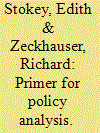| Srl | Item |
| 1 |
ID:
116172


|
|
|
|
|
| Publication |
2012.
|
| Summary/Abstract |
This article addresses the challenge of managing uncertainty when producing estimative intelligence. Much of the theory and practice of estimative intelligence aims to eliminate or reduce uncertainty, but this is often impossible or infeasible. This article instead argues that the goal of estimative intelligence should be to assess uncertainty. By drawing on a body of nearly 400 declassified National Intelligence Estimates as well as prominent texts on analytic tradecraft, this article argues that current tradecraft methods attempt to eliminate uncertainty in ways that can impede the accuracy, clarity, and utility of estimative intelligence. By contrast, a focus on assessing uncertainty suggests solutions to these problems and provides a promising analytic framework for thinking about estimative intelligence in general.
|
|
|
|
|
|
|
|
|
|
|
|
|
|
|
|
| 2 |
ID:
137054


|
|
|
|
|
| Summary/Abstract |
In a series of reports and meetings in Spring 2011, intelligence analysts and officials debated the chances that Osama bin Laden was living in Abbottabad, Pakistan. Estimates ranged from a low of 30 or 40 per cent to a high of 95 per cent. President Obama stated that he found this discussion confusing, even misleading. Motivated by that experience, and by broader debates about intelligence analysis, this article examines the conceptual foundations of expressing and interpreting estimative probability. It explains why a range of probabilities can always be condensed into a single point estimate that is clearer (but logically no different) than standard intelligence reporting, and why assessments of confidence are most useful when they indicate the extent to which estimative probabilities might shift in response to newly gathered information.
|
|
|
|
|
|
|
|
|
|
|
|
|
|
|
|
| 3 |
ID:
074280


|
|
|
|
|
| Publication |
New York, W W Norton and Company, 1978.
|
| Description |
356p.
|
| Standard Number |
0393090981
|
|
|
|
|
|
|
|
|
|
|
|
Copies: C:1/I:0,R:0,Q:0
Circulation
| Accession# | Call# | Current Location | Status | Policy | Location |
| 051750 | 350/STO 051750 | Main | On Shelf | General | |
|
|
|
|